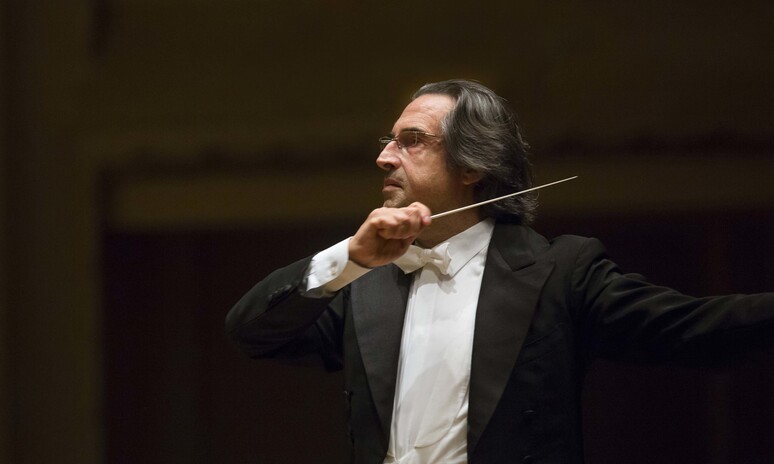Riccardo Muti is paying homage to the
generosity of the Jordanian people, who have received thousands
of refugees from Syria and elsewhere over the last decade, by
conducting a concert on Sunday, July 9 at the Roman theatre at
Jerash, the 'Pompeii of the East'.
Indeed, it is no coincidence that, after the debut show at
Ravenna's Pala De André arena on July 7 and the event in Jordan,
this year's The Roads of Friendship project will go to the
Teatro Grande at Pompeii on Tuesday, July 11.
Muti will bring together on all three stages the Luigi Cherubini
Youth Orchestra, the Cremona Antiqua choir and Jordanian
musicians.
They will perform Act II of Orfeo ed Euridice by Gluck with
counter tenor Filippo Mineccia, excerpts from Bellini's Norma
with the soprano Monica Conesa and Johannes Brahms' Das
Schicksalslied (The Song of Destiny).
These works will be inter-spaced with moments of music rooted in
the Middle East, with an ancient Mesopotamian hymn and songs
from the 20th century set to ancient verse by Syrian artists
Mirna Kassis and François Razek-Bitar and Jordanian singers Ady
Naber e Zain Awad.
The festival took the opportunity presented by the 100th
anniversary of the birth of Italo Calvino to name its XXXIV
edition The Invisible Cities, the thread of the shared Roman
past and archaeological heritage that links the two long-buried
cities - one by the ash of Mt Vesuvius, the other by desert
sands - to Ravenna.
During their leg in Jordan the Ravenna Festival musicians will
also visit the Za'atari refugee camp, home to tens of thousands
of refugees from neighboring Syria, and deliver new instruments
to musicians living there.
Brahms's Song of Destiny, which is set to a poem by Hölderlin
and was part of the programme of the historic first concert of
friendship in Sarajevo, is a meditation on the relationship with
the divine and the mystery of death.
The unsolvable doubt becomes music in Orfeo ed Euridice, in
which Orpheus crosses the boundary between life and death to
bring back his beloved Eurydice from the underworld.
The same doubt pervades Norma's prayer for peace to the moon in
a call for peace.
Under Riccardo Muti's baton, a possible answer emerges in the
ecstatic light that concludes Brahms's song, like a message of
redemption and hope.
Light and darkness, abduction and prayer mix in the five pieces
presented by the Syrian and Jordanian singers.
The Hymn to Nikkal, the world's oldest musical notation, comes
from far away.
The piece, which dates to approximately 1400 BC, was a call to
the goddess of the orchards and was found inscribed in cuneiform
on a clay tablet in the ancient Amorite-Canaanite city of Ugarit
in northern Mesopotamia.
Lamma Bada Yatahanna (She Appeared Swaying) is a traditional
Arab work of the muwashahah poetic-musical genre, a
contemplation of the beauty of a beloved person.
Ya Tuyour, a song that the Egyptian musician Mohamed el-Qasabgi
composed with inspiration from Strauss while maintaining Arab
forms, asks birds to be the ambassadors of romantic suffering.
The love for the homeland is at the centre of Ehkeeli Aan Baladi
(Tell Me about My Country) by Lebanese siblings Assai and
Mansour Rahbani.
The composer Dima Orsho created Those Forgotten on the Banks of
the Euphrates River set to an ancient Syrian poem that was
handed down orally in the region Tigris and Euphrates.
The Roads of Friendship project is supported by the Culture
Ministry and the Foreign Ministry, which, in line with the
strategy of strengthening cultural cooperation between Italy and
Jordan, will open a new Italian Institute of Culture in Amman.
The dialogue between Italy and Jordan is also manifest in the
exchange established between the City of Ravenna and the
Jordanian city of Madaba, the home to extraordinary Umayyad and
Byzantine mosaics.
A precious contribution comes from the La Cassa di Ravenna Spa,
which made the Pala De André event possible with its support.
The Jerash concert has the support of the Italian embassy in
Amman and the Emilia-Romagna Region with the collaboration of
the Jordan Italian Forum for Cooperation.
The show in the ancient city of Pompeii - organized thanks to
the cooperation of the Pompeii Archaeological Park and RAI
Cultura, which will record the concert to show it on Rai1 - is
totally funded by Ravello's Caruso, A Belmond Hotel.
ALL RIGHTS RESERVED © Copyright ANSA











